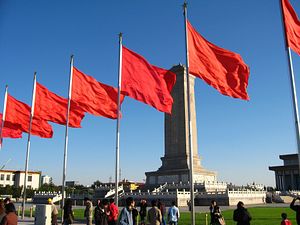The Chinese Communist Party should rejoice: it potential rivals are struggling. In the United States, President Donald Trump and the Republican Party devote their energies to trashing international institutions which anchor America’s hegemony. They look down on science. They seek to make America white, male, and Christian again to end its role as a universal nation. In Europe, Brexit, the fall of Rome to xenophobic populists, the entry of radicals with Nazi roots into the Austrian cabinet, the weakening of the German chancellor, and other ailments cripple the EU and NATO. Washington’s rejection of the Trans-Pacific Partnership (TPP), pressure for a protectionist bilateral trade deal, assaults on KORUS and NAFTA, and Trump’s soft spot for Chairman Kim are stabs in the back that enfeeble Japanese power.
But, so far, Beijing has not gained that much. Nations still led by mainstream executives, as well as the EU itself, seek to sustain the U.S.-designed world order in the hope that Americans will return to normalcy. Japanese Prime Minister Shinzo Abe’s Beijing journey was not a kowtow to the Celestial Emperor. U.S. partners attempt to avoid clashes with Washington and cooperate with elements of the U.S. government, such as the armed forces (and probably the intelligence agencies), that adhere to the pre-Trump paradigm.
Why is China not able to take better advantage of this moment?
For U.S. allies, path dependence hinders the quest for an alternative to the U.S.-centric setup. Moreover, Trump has not (yet) entirely destroyed their world. For Europeans, dealing with Brexit, and the demise of many Christian-democratic and social-democratic parties, keeps them focused on domestic threats.
There is also a Chinese angle. When Deng Xiaoping charted a new course, many foreigners thought that China would become democratic (whatever that meant). Others believed that it would evolve toward soft authoritarianism of a Singaporean type.
These observers interpreted the Tiananmen Massacre as a regrettable bump on the road. The following decades partially bore out their expectations. Chinese reforms lifted hundreds of millions of Chinese out of poverty. Intellectual exchanges with the West — and Japan — increased exponentially, entrepreneurship developed, some sort of civil society appeared. But under Xi Jinping, the trend has reversed. Stronger censorship and internment camps for Uyghurs are the new normal. The secretive imprisonment of elite Chinese on accusations of corruption reveals a purge backed by a hypertrophied personality cult. Beijing pushed to get its officials into senior positions in international organizations, only to detain the communist cadre it got appointed as president of Interpol.
These domestic developments hinder the emergence of a Chinese Dream with appeal overseas. The American Dream resonated all over the planet. Japan doesn’t have the same drawing power, but many Asians admire Japan and its society. A Middle Kingdom defined by unexplained disappearances, detention camps, propaganda, and the deification of Xi Jinping Thought (less attractive than Japanese anime) doesn’t make the grade.
Optimists also convinced themselves that China would morph into a status quo power, satisfied that its mass would foster a natural gravitational pull. But Beijing has chosen confrontation in the South China Sea and with Japan near the Senkaku/Diaoyu Islands. It engaged in economic warfare against South Korea over missile defense, seeks to delegitimize Taiwan, and is clamping down on freedom in Hong Kong. When added to its security services kidnapping nationals overseas, coercing Chinese citizens abroad and ethnic Chinese to toe the Party line, and unsophisticated attempts to buy influence, all these developments assure that many foreigners think that China is the enemy.
In the economic field, Chinese actions are convincing governments all over the world that Chinese investment can be a national security threat. Additionally, many — though not all — multinationals are disappointed by Chinese policies. Concerns about intellectual property theft, being forced into joint ventures, unilateral obstruction (Facebook and Google are banned in China; their Chinese counterparts are free to operate in America), the arrest of staff in a country without due process – all these factors make big business less willing to defend Beijing in foreign capitals. Numerous non-Chinese corporations make profits thanks to China and still lobby for Beijing, but some are less enthusiastic than before. This is an important development, since global capitalists were the Chinese Communist Party’s best agents of influence in the West.
The treatment of journalists is another issue. For example, denying a visa renewal in Hong Kong to a reporter from the Financial Times, the house organ of the cosmopolitan class, is the sort of behavior that ensures that Beijing’s image will take a hit.
As a result of China’s behavior, the belligerent tone of Vice President Mike Pence’s China speech did not bother American allies too much, including those who loathe the Trump administration, because they often agree with the United States that China is a menace.
The situation may look very different in a few years. Beijing has been lucky that rather than focus on China like a laser beam, Washington has also identified Canada, Mexico, Japan, South Korea, and the EU as malevolent economic foes. The increased tensions between the United States and Iran also relieve some of the pressure on China. But so far, despite Xi’s Davos speech in 2017 presenting Beijing as a defender of globalization, he has lost an opportunity to expand China’s influence and power.
Robert Dujarric is director of the Institute of Contemporary Asian Studies, Temple University Japan.

































